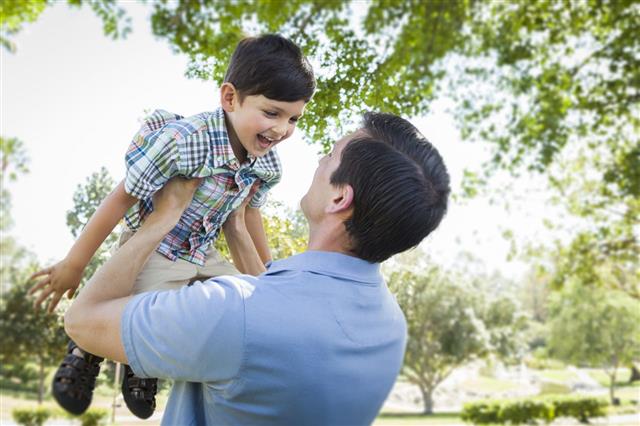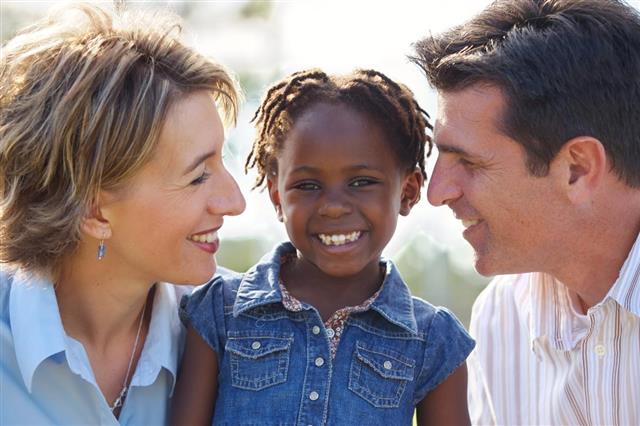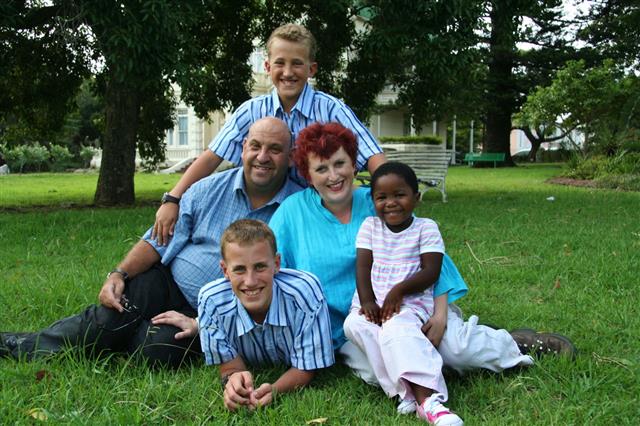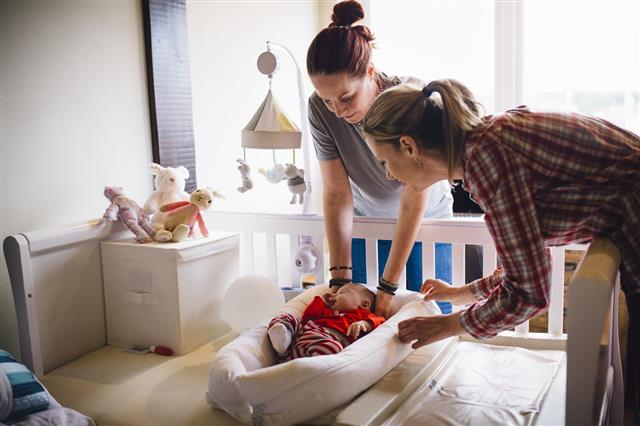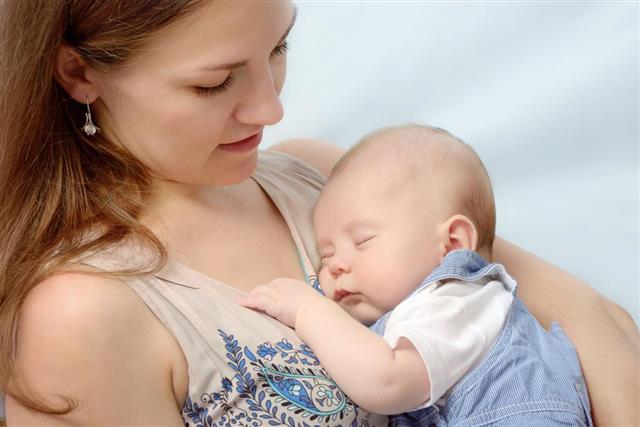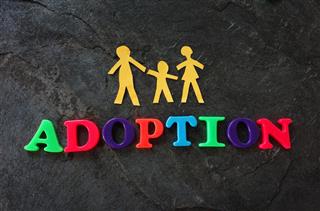
What is adoption? How does it affect the individuals involved? This AptParenting article helps you understand and deal with the psychological effects of adoption.
“Adoption is not about finding children for families, it’s about finding families for children. ~ Joyce Maguire Pavao, founder of the Adoption Resource Center in Cambridge, Massachusetts.
Child adoption is the process whereby children deprived of a family get people they can call their own and childless couples don’t remain deprived of the joys of parenting. Every child has a right to grow in a healthy environment. And this is exactly what adoption endorses. Adoption is a legal procedure that makes the birth child of a couple, the legal child of someone else. It is a process involving three parties, the birth parents, the adoptee, and the adoptive parents. So child adoption is likely to have effects on all three.
Effects on the Adoptee
Positive
▸ The adoptees who come from families that lacked financial support to raise them, get a stable family where their needs are taken care of. They are able to obtain good education and lead a comfortable life.
▸ Children may be put up for adoption because one or both their parents are involved in substance abuse or are physically abusive. In this case, the adoptees are freed from the emotional turmoil and instability that they would have experienced with their birth parents. On being adopted into a good family, they are able to lead a peaceful life.
▸ On being adopted, children who would have been uncared for, get a place to call home. They get a family that is eager to give them love, care, and security.
▸ Children in foster care systems may have special needs which are taken care of by the family they are adopted into. They get a family setting, which allows for a better emotional development.
▸ Children of single parents get a two-parent home and may be even siblings, thus aiding their social and emotional development.
Negative
▸ Studies show that adopted children have higher chances of developing mental and behavioral disorders. Those living in foster care homes where their care was neglected for long, are at a higher risk of facing problems in development. It could also be because their mothers were involved in alcohol or drug abuse during pregnancy, thus hampering their development in the womb. Another reason for social or emotional problems in adopted children is that they may be from families that lacked structure or a healthy environment. During early childhood, the nutrition needs of these children may have been ignored, thus resulting in their unhealthy development. The data is statistical and does not apply to all adoptees.
▸ Adopted children become vulnerable, emotionally. They know they were not involved in the decision of adoption and thus realize that they had no control over the loss of their birth family and the choice of their adoptive family. There is a feeling of loss of control in the children being adopted as they have no role in choosing who they would live with for the rest of their lives. It’s not easy to accept the fact that someone has ‘chosen’ you to be their children.
▸ During their teenage years, the adoptees may start feeling lonely. They may long for their birth parents and feel an intense need to search for who they were and why they put them up for adoption.
▸ Adopted children may feel insecure because they are questioned about their birth parents and other blood relations.
▸ They lose one identity and borrow another from the family which adopts them. This leads to identity crisis. Many issues intrinsic to the adoption experience come together when the adoptee reaches adolescence. At this time, there is an acute awareness of being adopted. There is a drive towards liberation accompanied by the urge to develop one’s own identity. Living with the fact that you are an adopted child may become difficult.
▸ They realize that their biological parents decided not to look after them. This may trigger feelings of unwantedness in the adopted children. They may also be affected by the separation from their parents.
▸ It may be difficult for the adopted children to accept the adoptive family as their own.
Effects on the Adoptive Parents
Adoption does not end at bringing a child home. It involves planning for the child’s educational and other needs and giving them a secure future. It affects the adoptive parents at two different levels, emotional and financial.
Positive
▸ Many go in for adoption after a failed pregnancy or the death of their child. Some choose to adopt a child due to medical reasons like infertility. In such cases, the adopted child, to a certain extent, compensates for the absence of a biological child, which is emotionally healing for the parents.
▸ Couples who cannot have children benefit from adopting a child, as through adoption, they have someone to care for, love and be loved. Bringing home a child, taking the responsibility of his upbringing, and giving him a secure and happy life makes the adoptive parents’ life even more fulfilling.
▸ Even couples who have a biological child may choose adoption for reasons like giving their child a sibling, extending their family, or for a social cause. In these cases, the parents earn the opportunity to change someone’s life for the better. The family that adopts gives someone in need, a home, a family, and love and care.
Negative
▸ Children may face difficulties in adjusting with the new family. In the initial days, the adoptive parents may feel incompetent to help the child settle in their family.
▸ The curiosity in the adopted child about his biological parents, and the questions that follow may be difficult to manage. He may not be of the age where he can understand the concept of adoption or the reasons he was put up for it. The adoptive parents or other members of the family may face difficulties in answering his questions about this.
▸ The children in the family may not be able to willingly accept the addition of a new member in their family. There may be issues with sharing a room among other things. These factors may lead to strained relations between them and their parents.
▸ Moreover, such issues may not give the adoptive parents and the adopted children enough space to come close or to know each other.
▸ Adoptive parents start having expectations from the adopted child. His inability to fulfill their expectations (from education to choosing a profession or behaving in a certain way) might make the adoptive parents sad. In case of having biological children, the parents may tend to compare them with the adoptees, which may not be healthy for the adopted child’s development.
▸ Till the child is told about having been adopted, the adoptive parents tend to worry about the effect it may have on the child. They doubt that the knowledge of being an adoptee may affect the child negatively.
▸ When with the adopted child, if the parents always carry the thought that they are not his biological parents, it may lead to improper parenting. The adoptive parents either become over-protective towards the child or they may care less.
▸ Child adoption affects the adoptive parents at a financial level too. Having a new member in the family increases the family’s expenses.
Effects on the Birth Parents
Positive
▸ It’s natural for the biological parents to feel sad and guilty about not being able to raise their child. But that they could ensure a better future for their child can be a little comforting.
▸ A single parent can give his/her child a family and thus a better environment.
▸ If due to social or financial incapability, a parent is not in a position to give his child a secure future, having responsible and loving parents adopt him, can help the parent meet the child’s needs. Having a good family take care of their child can be solace for the parents, as with this, the child won’t be deprived of opportunities in life.
Negative
▸ Putting up their baby for adoption is not easy for the biological parents. It’s the circumstances that lead them to do so. It’s emotionally taxing for them to give their child for adoption and have someone else take care of him. In the hope of a better living for their children, parents put up their child for adoption. But the decision is not easy.
▸ Even if putting a child for adoption is a choice of the parents, it’s something that circumstances compel them to do. They experience the sorrow that is no less than the grief of loss. But it often goes unrecognized.
▸ Birth parents may begin to hate themselves for being incapable of raising their child. They may invite ridicule from society.
▸ They might never know who the adoptive parents of their child are. Or even if they know the parents, they may not know how their child is being raised. This may lead them to worry about their child’s future.
▸ It is observed that birth mothers who know they would be putting up their baby for adoption, have long conversations with the fetus during pregnancy. In some cases, mothers are pressurized to put their babies for adoption and they do so against their will. They begin to hate themselves for the helplessness. They feel anxious about the welfare of their child.
▸ Perhaps, the most difficult thing for these parents is to live with the guilty conscience of not having raised their children.
Open Adoption
Open adoption can be defined as a process in which the adoptive and biological families have access to each other’s personal lives and can choose to stay in contact. It is helpful for the overall development of the adopted child, as the process allows him time to adjust to the new environment and accept new relations. Moreover, he can stay in communication with his birth parents. Open adoption helps the child as well as the adoptive and biological parents to adapt to the change in a better way.
International Adoption
Effects of international adoption include chances of malpractices such as child trafficking and sale of children. Also, there may be less intimacy in the new relationship as it can be difficult for both parents and the child to break the cultural barriers between them. But when seen in the positive light, we realize that adoption can give several underprivileged children a secure future. When kids from underdeveloped or poor countries are adopted by high society people, their needs can be well catered to and they get educational and career opportunities that they would have been deprived of.
While the negative effects associated with adoption include loss, rejection, guilt, and sorrow, the positive side of adoption is that the homeless children get homes and the orphaned and the neglected ones get a family. Couples who want to have children but cannot have their own, do not have to remain childless, thanks to adoption. Also, child adoption gives families an opportunity to do their bit towards the society. Though difficult in the beginning, adopting a child is indeed a rewarding experience. A child enters your family and a beautiful bond is created. Adoption is indeed a life-altering event. Its negative psychological effects can be minimized with the support and cooperation of the families involved.
